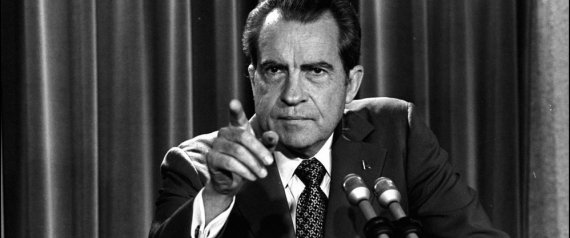Lessons From Richard Nixon, the Father of the Modern Republican Party
Posted:
Updated:
It was Nixon who found the formula for siphoning away Democratic voters. Nixon was patriotic -- he was the first president to wear the American flag in his lapel -- and he sincerely appealed to love of country. But he was more practiced, and more effective, at the politics of resentment. Nixon was a lonely outsider who became one of the most successful politicians of the 20th century (he was on five national tickets, winning four times, a record exceeded only by FDR) by tapping into a basic truth: a majority of Americans feel like they are outsiders, too. Now all candidates, Republican or Democrat, run against Washington, and they use tools first developed by Nixon, including the careful exploitation of demographic data. Nixon found in alienation a powerful political force that powered him to the top. The same force -- cautionary tale, here -- also destroyed him. The Republicans would do well to look at Nixon as the true father of their party -- and try to avoid replicating his tragic flaw.
In 1967, as he was quietly preparing his comeback from political oblivion (Nixon had narrowly lost to JFK in 1960 and then badly lost the California governor's race in 1962, acidly telling the press, "You won't have Dick Nixon to kick around any more"), Nixon read a memo from a then obscure congressional staffer named Kevin Phillips. The memo was entitled "The Emerging Republican Majority." Phillips was hired by Nixon as an "ethnic specialist" and set to work producing demographic charts and statistics that boiled down to knowing, as Phillips put it, "who hates who." With Phillips as a tutor, Nixon figured out how to play on wariness and anxiety, particularly that of blue collar Democrats who were put off by the hippies and draft dodgers of the late 1960s and frightened by racial unrest and black militants. These flag-waving, family-oriented, anti-elitist lower and middle class voters who had once cast their ballots for Franklin Roosevelt and the New Deal were the base of what would, by a later generation, be called Reagan Democrats.
Nixon grasped that voters were not just driven by economic wishes but by the emerging "social issue," which in the late '60s and early '70s was what Nixon called "permissiveness." Changing social mores disconcerted voters (even as many ordinary middle class people grew their hair and shortened their skirts). Nixon rode the social issue to a landslide in 1972. He once commented that if voters were just worried about economic issues, George McGovern might have won -- the country was actually pretty liberal about taxing, spending and Big Government in 1970. So, for that matter, was Nixon, who signed a raft of social welfare legislation and created the Environmental Protection Agency.
Nixon also coined the term "the Silent Majority." He first used the expression in a speech in November 1969 castigating all the noisy anti-Vietnam War protesters. Nixon saw that the great majority of the country felt under-represented or ignored by the so-called East Coast Media Establishment. It is not a coincidence that in 1968 Nixon had hired as his media consultant a then obscure TV talk show producer named Roger Ailes -- who, of course, went on to create a news empire for Fox TV.
Nixon, it is important to note, was not angling for haters or racists. In 1968, he competed not only against Democrat Hubert Humphrey but Alabama's Governor George Wallace, who ran as an independent on the platform of "Send 'Em a Message!" Although Nixon employed a "Southern Strategy" to push the old Democratic Solid South into the Republican column, he was never overtly racist. He was accused of pandering by northern liberals, but in fact he ran as a moderate (and, indeed, after winning the presidency Nixon quietly but effectively de-segregated the public schools of the deep South).
Politically, Nixon was not a hater. Privately, he could be. This was Nixon's downfall. He let his jealousies and aggrievements, his old hurts, get the better of him. He lashed out at his enemies in the liberal press, particularly the Washington Post (he tried to strip the Post Company of its TV licenses). That was not smart fight to pick, as he learned to his dismay in the Watergate scandal. As Nixon was leaving the White House on the day of his resignation from office, August 9, 1974, he said, "Always remember, others may hate you, but those who hate you don't win unless you hate them, and then you destroy yourself."
Too late for Richard Nixon. But not too late from the Republicans -- or the Democrats. In hyper-partisan America, each side seems determined to hate the other, or at least feel morally superior.
The party that remembers that the Silent Majority was built from the entire country -- not just evangelicals, or Bi-coastals, or Red States or Blue States -- will have the best chance of getting to 51 percent in November 2016.
Evan Thomas is the author of BEING NIXON, published next week by Random House.


No comments:
Post a Comment